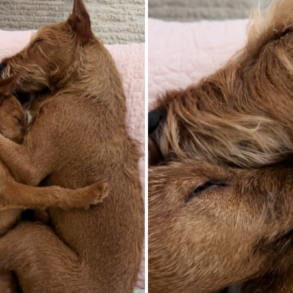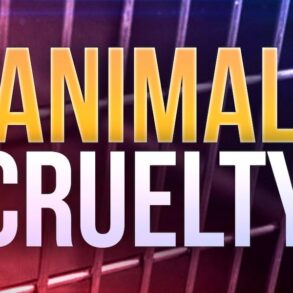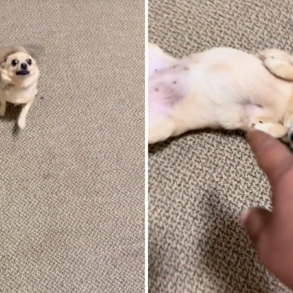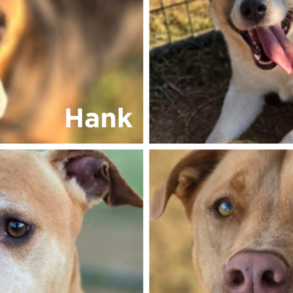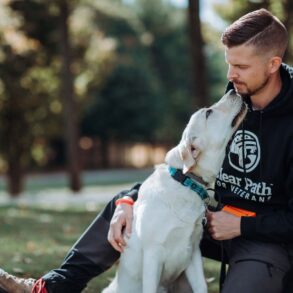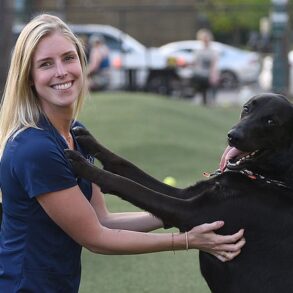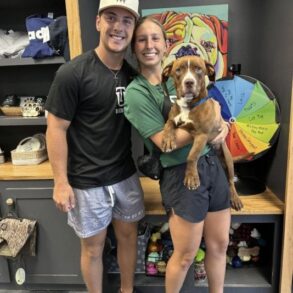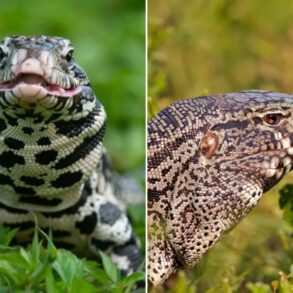A person observing the American election from abroad could be forgiven for thinking that we’ve all finally succumbed to toxoplasmosis this year, given how pet-forward the discourse has been. There is nothing that Americans love as much as their Fluffys and Buddys—the United States has more domestic cats and dogs than anywhere else in the world, with an estimated 62 percent of Americans (or more than 80 million households) owning a pet, and the vast majority saying that their pets are part of their family—and that’s reflected in the litmus test by which politicians running for public office are judged every four years. Like a supportive spouse, loving kids, or photo evidence of having grilled a pork chop, having a pet—particularly a dog, the preeminent American companion—is proof of relatability, authenticity, and fundamental goodness. Joe Biden has historically favored German shepherds of a bite-y disposition; Barack Obama fulfilled his campaign promise to his daughters and welcomed the Portuguese water dogs Bo and Sunny to the White House; Richard Nixon, running for vice president with Dwight D. Eisenhower, famously saved his place on the Republican ticket with a speech about his cocker spaniel Checkers. Forget which presidential candidate you could have a beer with—which one could you bump into at the dog run?
It’s a strange measure of electability, made even stranger this year because both candidates in the top slot are notably petless. Donald Trump, in fact, was one of the only presidents to have gone without a pet while in office, and media outlets like the Washington Post describe him as a “notorious dog hater” who often insults people by referring to them as dogs. And yet the iconography of pets—and all that they represent—has never loomed larger. This spring, South Dakota Gov. Kristi Noem blew her chances of joining Trump’s ticket when she revealed in her memoir that she had deliberately shot and killed her pet dog Cricket, earning the criticism of everyone from her would-be running mate to famed dog lovers like Mitt Romney. Republican vice presidential candidate J.D. Vance’s attempt to reupholster his image by bringing his dog Atlas (yes, as in “shrugged”) on the campaign trail backfired after online commentators and professional dog walkers questioned whether he had even met the dog before. Kamala Harris’ running mate Tim Walz, by contrast, is renowned, at least by Democrats, as the very picture of a pet dad—having long shared snapshots and funny anecdotes about his rescue dog and cat on social media. Even that innocuous reality has been the center of a baseless right-wing conspiracy theory accusing Walz of trying to pass off two different dogs as his pooch Scout.
But for a nation whose dream has always included a white picket fence and man’s best friend, the 2024 election is shaping up to be all about cats. In a 2021 interview with Fox News host Tucker Carlson, Vance said that the U.S. was being ruined by “childless cat ladies,” invoking a long-held stereotype about single women. Vance’s disdain for any living woman isn’t surprising, and neither is his distaste for cats: A report in the peer-reviewed psychological-science journal Collabra found that “political identity is a robust predictor of pet preferences,” with conservatism corresponding to less liking for cats and a greater preference for dogs. (One possible factor that the researchers found evidence of: an affiliation with right-wing authoritarianism, a set of attitudes in psychology associated with the need to follow authority figures. Cats, after all, aren’t particularly known for respecting, well, anyone.)
Still, there are more than 46 million cat-owning households in the U.S., and at least 21.9 million women of childbearing age who have not given birth, so it’s even more impressive that, after clips of the interview resurfaced this summer, Vance decided to further piss off both voting blocs by refusing to apologize or walk back his comment. In response, liberal women have turned childless cat ladies into a rallying cry of sorts. Taylor Swift, who officially endorsed Harris this week with a photo of herself holding one of her three cats, called herself a “childless cat lady,” as have other celebrities like Chelsea Handler, Linda Ronstadt (not childless, technically), and Stevie Nicks (dog lady, technically). Just as the pink pussyhat became a symbol of resistance following Trump’s victory in 2016, the cat has emerged as this election’s progressive emblem. Already, T-shirts and yard signs emblazoned with variations on “Cat Ladies for Harris” have started appearing in the wild, each as much a proclamation of defiance as a declaration of allegiance.
Electoral politics has always boiled down to identities: carving up the self and the population into discrete parts—gender, race, religion, sexuality, class, location, profession, stance on, uhh, fracking—and slotting them into different buckets. With the growing significance of pets in Americans’ lives, and the crystallization of “pet owner” as a social identity, it was only a matter of time before types of pet owning got massaged into political identities as well. When Noem wrote in her memoir about shooting Cricket, it wasn’t just a humblebrag about killing her canine—it was, as New York Times critic A.O. Scott notes, a positioning of herself as “a particular kind of dog person: the unsentimental, law-and-order, decisively alpha kind, in keeping with the style of governance that [her book] seems to promote.” When Vance sneers at cat owners, he is signaling to other right-wing alpha men his contempt for the kind of people who would let a small, fluffy 10-pound creature completely flout their humans’ authority.
But while pro-Harris voters are free to mobilize under the banner of cat ladies if they so wish—hey, whatever gets people to the polls, right?—there’s a flip side to the burgeoning weaponization of Americans’ love for their pets in political fracas. The right can just as easily exploit this identity and this attachment, as they have in the past week, spreading heinous lies that Haitian immigrants in the U.S. are stealing and eating Americans’ cats and dogs. This line of accusation has long been a dehumanizing tactic used against nonwhite immigrants—I can’t tell you how many times anonymous online trolls have called me a “chink dog eater” on the basis of my surname alone, particularly around the height of COVID lockdowns—but its deployment now is particularly cruel as the locus of the made-up story, Springfield, Ohio, has already been troubled by bigots complaining about a surge in immigration from Haiti over the past few years. Vance amplified the rumors on X, coyly noting that “it’s possible … all of these rumors will turn out to be false,” before launching into an anti-migrant tirade anyway; Trump, during this week’s presidential debate on ABC, repeated the claim, saying that he’d heard it from “the people on the television.” As memes and ass-ugly A.I.–generated images of kittens and puppies in peril flooded the MAGA internet, Haitians in Springfield reportedly faced intimidation, bullying, and property damage, and the city mayor said that a bomb threat that had forced the evacuation of municipal buildings had specifically targeted immigrants and Haitians.
Pets are defined not so much by what they are but by their exception to the rules that govern humans’ treatment of other animals. Pets in England during the period between 1500 and 1800, for example, shared the traits of 1) being kept in the house, 2) being given a name, and 3) never being eaten, according to British historian Keith Thomas. They are made honorary humans, in other words. So of course the notion of killing—let alone eating—cats and dogs is disturbing to many. “People do not want to think about giving an animal the status of a person and then killing it ‘like an animal,’ ” animal-studies scholars Alan M. Beck and Aaron Katcher write in Between Pets and People: The Importance of Animal Companionship. “This process of stripping animals of their human status is too close to a similar process: the act of stripping human beings of their human status before killing them.”
The twisted reality at which we have arrived with the Springfield lie, then, is the subversion: elevating fictitious animals, which have been assigned the status of a person, above real people who, by dint of the dehumanizing language and attacks wielded by anti-migrant bigots, have been virtually stripped of their human status. Immigrants, in this deadening worldview, are aliens, roaches, animals invading our soil and threatening the American way of life; but they are never people, not even as much as a pet is.
Pets provoke heated emotion in many of us; just recently, New York magazine had to issue multiple statements requesting that readers stop harassing its editorial staff about a month-old, to my eye dreadful story in which an anonymous writer confessed to neglecting and mistreating her cat after giving birth. I get it: I loved my childhood pets, and my own family has accused me of treating dogs better than I do people (which may or may not be true, and may or may not be a moral failing). Everyone can agree that all animals—and not just cats and dogs—should be treated better. But if the MAGA right was able to so easily weaponize the love of pet owners, it’s because the fault line was already there, a fissure in the terra firma of our culture. Cats and dogs make for catchy slogans and beloved friends, but maybe we assign too much meaning to what they represent. Let pets be pets, not mascots or bogeymen; if they could speak, I’m sure they’d thank you for it.
This post was originally published on this site be sure to check out more of their content.





